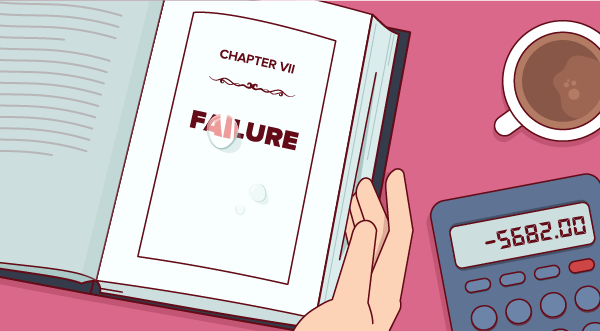Wil Schroter
The hard thing about failure is putting it into perspective. Startups Fail. All the time.
I speak to Founders and co-founders all the time who are going through the most brutal moments of their professional careers. For them, it feels like an eternity, and more importantly, it feels like a permanent tombstone for the rest of their career.
For me, it's the millionth time I've seen the same story play out. A Founder gets fired up about a new venture and building something amazing, it goes well for a while, then out of nowhere it tanks, and the Founder feels like it's the end of the world. Except I've been doing this for 30 years, and I've had plenty of these moments myself.
What matters in these moments is getting some perspective on how fleeting they are, and more importantly, how they are only one small bit of a much larger story.
Founder Failure is just One Chapter in Startup Life:
For Founders, it feels like an eternity, and more importantly, it feels like a permanent tombstone for the rest of their careers.
However, this perspective is skewed because they are only seeing a small moment in time and not the larger story.
What matters most is getting some perspective on how fleeting these moments are.
More importantly, recognize that these moments are only a fragment of a much larger story.
Startups Can Fail Permanently — but for Founders it's temporary.
When I'm at the blackjack table, I always have this idea in the back of my mind that I can go on winning forever because winning just provides more money to play. But I can only lose entirely once because once the money is gone, I can't sustain. Also, my wife makes me leave the table.
The same goes for our startups. We can run a successful startup for decades, but if we have a fatally bad single year — we're done.
What that means for Founders is that our failures actually don't have a particularly long life span. They tend to eat up any resources we'd have for keeping things alive in a relatively short period of time, so they end up containing themselves, albeit painfully, to a short time frame.
Startup founders, you're going to fail. It's not a question of if, but when. The good news is that failure doesn't have to be a long, drawn-out process. Here are four quick tips on how to move on quickly from your startup failures.
Recognize that failure is part of the journey. No one gets it right the first time around, and as a startup founder, you're going to make mistakes. It's important to accept this fact and learn from your failures.
Don't dwell on your failures. As soon as you recognize that you've failed, start moving on and focus on what you can do to fix the situation. Wallowing in self-pity will only hold you back from progress.
Take lessons from your failures. Failure provides valuable lessons that can help you become a better entrepreneur. Make sure to learn as much as possible from your mistakes so you don't make them again in the future. With the right attitude, you'll see them as a stepping stone to future success.
Move on quickly and don't look back! As painful as it may be, try not to dwell on past failures and instead focus on what lies ahead for your startup or the next amazing opportunity.
No matter how difficult, it's important to keep our heads held high and move forward. We can't fail for long, so make sure to take all the lessons you learned from your failures and use them to become a better and stronger entrepreneur.
Remember: Failure is part of learning and growing as a Founder. Don't be afraid to fail fast— embrace the challenge and use it as an opportunity to learn and grow! With hard work, dedication, a network of supporting entrepreneurs and the right mindset, you can overcome any obstacle and succeed.

It's a Chapter, Not a Book
Startup founders and co-founders need to remember that failure is a single chapter in their lives.
It's hard to imagine during a chapter of failure, but it's just a moment in time.
The reason this perspective is so important is that at the time, we think that failing is something that is permanent.
We think failing projects across the entire rest of our career as if all of our effort going forward is incidental.
That's the flaw in our thinking. What we're about to close is a single chapter in our book. It's a shitty chapter, no doubt, but it's a single chapter all the same.
There were chapters before this one, some good, some bad, and there will be many chapters after this one. We have to focus on starting the next chapter, not how we're failing in the current chapter.
We have to remember that failure is a single chapter, not the whole book. With our resilience and determination, we can turn every failure into an opportunity to learn, grow and succeed in the future.
We should use this as motivation for us to keep going and never give up on our goals.
Remind ourselves that it's just one chapter in a story that can become much bigger and better.
We have the potential to turn failure into success and with hard work, dedication and resilience, anything is possible.
So remember, it's a chapter, not an entire book! You're strong enough to start writing the next one.

Every Founder has Bad Chapters
It's easy to forget that every Founder has bad chapters. You know who doesn't forget that? Those Founders. It's almost like you're not truly a Founder unless you've had a chapter in your history where you've come from nothing or lost everything. It would be really cool if we could just write stories without those chapters where we simply achieve success with our startups without failure. Yet personally, I've met very few Founders who don't have one or more failed chapter, where they let down their investors, their team, or their customers.
Later on, we go and tell stories, and write an article about how we came back from that awful chapter to build something amazing. It sounds like a great story, but the audience forgets that it's Founders like us that actually had to live through those chapters in order to be out there telling the story to begin with.
As Founders, there is almost one certainty — we either have had a bad chapter or we will have one. It's what we do. If you're going through one right now, you have the condolences of me and the entire Founder family worldwide. But remember, like the rest of us, you'll go on to write much better chapters in the future. Time to turn the page, my friend, and write something better on the other side.
As a Founder, you're probably familiar with the feeling of having a bad chapter in your history.
It's something that we all go through at some point, and it can be tough.
But it's important to remember that this doesn't define us or our future.
In fact, many Founders have gone on to build amazing things after going through a tough time.
Here are some tips for turning the page and writing a new chapter in your story:
1. Take a step back and reflect on the situation – it's important to take some time to evaluate what went wrong and why, so that you can make sure to avoid the same mistakes in the future.
2. Reach out to your network for support – don't be afraid to reach out for help from other Founders who have gone through similar experiences. Chances are they've gotten some of the same things wrong that are plaguing you now.
3. Find the silver lining – try to take some lessons away from this experience and use them to your advantage with future startups.
4. Take action – don't let yourself get stuck in a rut; instead, focus on taking steps forward towards success.
5. Celebrate small successes – don't overlook the significance of small wins, as they can make a big difference in your long-term success and that of your team.
No matter what chapter you're currently in, never forget that you have the potential to write a better one. With hard work and resilience, anything is possible! You got this – don’t give up!
We’re all in this together, and no Founder should ever have to go through bad chapters alone. Reach out for help from your network and never stop striving to turn the page on whatever chapter you’re currently in - there’s always something new around the corner.
The journey of a startup Founder is never easy. But it’s the bad chapters that make the good ones even more enjoyable and meaningful. So, when you come across an obstacle, don’t forget — every Founder has bad chapters - and obstacles are just a stepping stone. It’s just part of the process. And with enough resilience and determination, you can turn any chapter into a success story. So don’t give up — you got this!
Good luck and remember, every Founder has bad chapters. You can overcome them and write something even better. It's all about turning the page.
Best of luck on your journey as a startup Founder! Keep pushing forward and never forget: Every Founder has bad chapters — it's just part of the process. But with enough determination and resilience, you can turn any chapter into a success story. So don't give up! You got this. It's time to turn the page and write something even better.

Founders, Here is how to get started writing the next chapter
So what can you do now that you know every Founder has bad chapters in their history?
Reach out to your network for support – don’t be afraid to reach out for help from other Founders who have gone through similar experiences.
Find the silver lining – try to take some lessons away from this experience and use them to your advantage in the future.
Take action – don't let yourself get stuck in a rut; instead, focus on taking steps forward towards success.
Celebrate small successes – don’t overlook the significance of small wins, as they can make a big difference in your long-term business success.
Remember that anything is possible - no matter what chapter you're currently in, never forget that you have the potential to write a better one and succeed.
You got this - so don’t give up! We’re all in this together, and no Founder should ever have to go through bad chapters alone
In Case You Missed It
Many Startups Shut Down a Few Times Before Succeeding (podcast) It's time to know the truth about Startup shutdowns and why they don't mean absolute failure.
My Startup is Tanking, but am I Safe? As a Founder, when the business is struggling it can feel like that struggle is linked to your personal life and your personal safety — and you could suffer greatly as a result.
We Need a Strict Definition of Personal Success Every moment we spend pursuing an undefined goal is a complete waste of time — especially personal goals.
Find this article helpful?
This is just a small sample! Register to unlock our in-depth courses, hundreds of video courses, and a library of playbooks and articles to grow your startup fast. Let us Let us show you!
Submission confirms agreement to our Terms of Service and Privacy Policy.